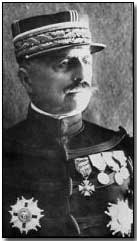Who's Who - Louis Franchet d'Esperey
 General Louis Felix Marie
Francois Franchet d'Esperey (1856-1942) served in active field command
positions in the French army during World War One on both Western and Balkan
Fronts.
General Louis Felix Marie
Francois Franchet d'Esperey (1856-1942) served in active field command
positions in the French army during World War One on both Western and Balkan
Fronts.
A man of tremendous energy and intimidating demeanour - d'Esperey (known by his popular if unfair nickname 'Desperate Frankie') was not one to frequently invite or welcome advice from subordinates - d'Esperey's war career saw greatly mixed fortune, and was similar in some ways to that of British general Sir Edmund Allenby.
His war began in command of I Corps which formed part of General Lanrezac's Fifth Army at Charleroi. Having played his part in successfully defending Fifth Army's right (thereby disrupting the German Schlieffen Plan) d'Esperey was handed command of Fifth Army itself with Lanrezac's removal as commander (for displaying a want of 'offensive spirit').
Thus d'Esperey was in place to lead Fifth Army in time for the critical First Battle of the Marne in September 1914. Victory there led to promotion in command of Eastern Army Group, again on the Western Front.
With Joseph Joffre's delicately managed removal as Commander in Chief in December 1916 (where the famed and popular commander was given a 'promotion' to Marshal) d'Esperey's name was considered as his replacement. However d'Esperey's staunch Roman Catholicism acted against him among French army anti-clerical circles and the post went instead (disastrously) to Robert Nivelle.
Appointed commander of the Army Group in Champagne throughout 1917 d'Esperey was as ardent a supporter of offensive warfare as Joffre before him. This led him to defy orders to adopt so-called elastic 'defence in Depth' during the great German spring push of 1918. Consequently the Germans succeeded in securing significant gains during the May 1918 Third Battle of the Aisne, for which much of the blame can be (and was) assigned to d'Esperey.
Among the command bloodletting that followed the Aisne fiasco d'Esperey found himself displaced to the malarial backwater that was the war in Salonika. Like Allenby before him (when he was removed from the Western Front and despatched to Palestine) d'Esperey turned disaster into great personal and professional success.
In any event an early supporter of Allied commitment to the Balkan Front and well-versed in the region's politics d'Esperey applied his boundless energy and enthusiasm to rejuvenating Allied operations in the area, determinedly (and successfully) implementing a battle strategy prepared by his predecessor Adolphe Guillaumat.
This resulted in the overwhelming allied success at Vardar in September 1918, which forced Bulgaria out of the war by the end of the month.
With the end of the war d'Esperey remained the Allied commander on the ground in the Balkans until 1920. In 1922 he was made a Marshal of France, remaining on active command into the 1930s. In 1934 he was elected to the French Academy.
He died in 1942.
Click here to read d'Esperey's official report of the Vardar Offensive; click here to read the text of his telegram to Greek Prime Minister Eleutherios Venizelos praising the conduct of Greek troops during the offensive.
The German word "U-Boat" was derived from "Unterseeboot" (undersea boat).
- Did you know?
